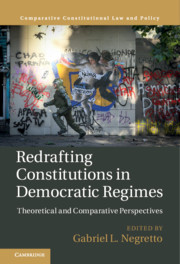Book contents
- Redrafting Constitutions in Democratic Regimes
- Comparative Constitutional Law and Policy
- Redrafting Constitutions in Democratic Regimes
- Copyright page
- Dedication
- Contents
- Tables
- Contributors
- Acknowledgments
- 1 New Constitutions in Democratic Regimes
- Part I Conceptual, Normative, and Empirical Issues
- 2 Constitution Making through Law
- 3 Expanding Revision Clauses in Democratic Constitutions
- 4 Courts and Constitution Making in Democratic Regimes
- 5 Replacing Constitutions in Democratic Regimes
- Part II Case Studies
- Index
- References
2 - Constitution Making through Law
from Part I - Conceptual, Normative, and Empirical Issues
Published online by Cambridge University Press: 29 August 2020
- Redrafting Constitutions in Democratic Regimes
- Comparative Constitutional Law and Policy
- Redrafting Constitutions in Democratic Regimes
- Copyright page
- Dedication
- Contents
- Tables
- Contributors
- Acknowledgments
- 1 New Constitutions in Democratic Regimes
- Part I Conceptual, Normative, and Empirical Issues
- 2 Constitution Making through Law
- 3 Expanding Revision Clauses in Democratic Constitutions
- 4 Courts and Constitution Making in Democratic Regimes
- 5 Replacing Constitutions in Democratic Regimes
- Part II Case Studies
- Index
- References
Summary
Does the absence of a legal rupture, the failure to put into practice the idea of a legally unrestrained popular sovereign, necessarily mean that an exercise of constituent power has not taken place? Can constituent power be exercised through law? These are questions that indirectly challenge one of the features normally attributed to constituent power: its unmediated and uncontrollable nature. This chapter will compare two traditions of constitutional thought (that of Sieyès and Rousseau) that provided different answers to those questions and explore the ways in which the idea that constituent power can be exercised through legally recognised procedures has figured in later constitutional theory and practice.
- Type
- Chapter
- Information
- Redrafting Constitutions in Democratic RegimesTheoretical and Comparative Perspectives, pp. 33 - 52Publisher: Cambridge University PressPrint publication year: 2020
References
- 1
- Cited by

